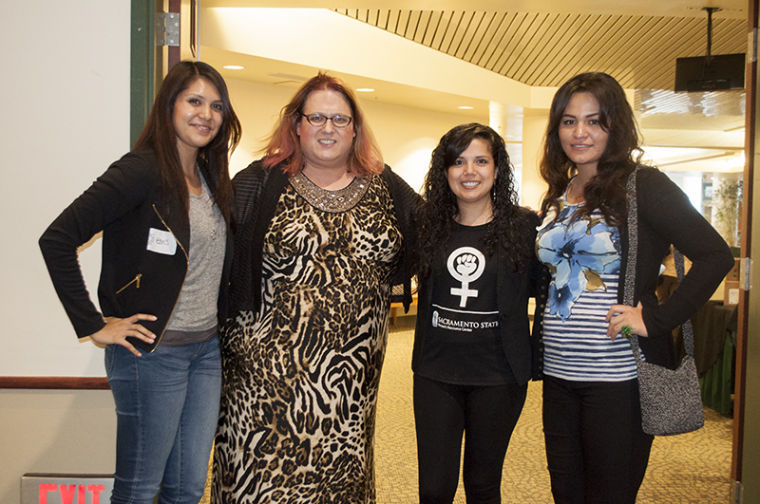Finding her identity
J’Lissabeth Faughn (in dress) is the coordinator of the Pride Center, Multicultural Center and the Women’s resource Center.
April 8, 2014
With the biblical name John means a gracious gift of God and the name Elizabeth means oath of God, that is what J’Lissabeth Faughn believes she is; a gift.
Faughn was born perceived to be male and was given the name John but when she later identified herself with being transsexual, Faughn asked her mother what she would have been named if she was born perceived to be female. Faughn’s mother picked Elissabeth.
Faughn took on the name of John Elissabeth, but over the years her students combined John and Elissabeth creating her name J’Lissabeth.
Now, Faughn is the Director of the Multi-Cultural Center, PRIDE and Women’s Resource Center at Sac State and she is also transgender. Faughn said she believes that she is a gift from God who has been given a voice.
“I fully believe that my identity is a gift from God, Allah, Buddha or whatever,” Faughn said.
Faughn said that growing up, she always loved to do activities considered to be gender specific to boys such as football. However, Faughn said she also had an interest in women’s clothing and fashion.
When Faughn was 14 she came out as gay, but said that identification never felt right to her because she never connected with the gay male culture. In college, Faughn said that a fraternity brother suggested she was bisexual, but she was not ready to be affectionate with anyone.
“I wasn’t interested in being intimate with someone because I wasn’t comfortable with myself,” Faughn said.
In the late 1990s during graduate school, Faughn realized that her identity was about her gender and came out as transgender after finally getting the ah-ha! feeling of finally realizing who she is.
Faughn’s mother was an educator and her father fought in World War II, Korea and Vietnam, but she said that they were accepting of her which is not always the case for transsexuals.
While Faughn received support from her parents and many friends, she said she lost a lot of people because of her identity.
Faughn has not always been met with tolerance and kindness, in fact she said she has been attacked mentally, emotionally and physically.
Faughn said she was once attacked with a crowbar in a parking lot in St. Louis and spent three days in the hospital. Although she reported the attack, the assailants were never found.
She said she also found oppression and discrimination in the workplace.
Faughn became a member of the Sac State campus in July 2013 after coming from an extensive background in student affairs at other universities. Faughn worked as a coordinator for the LGBTQ centers at Iowa State University, the University of Missouri and UC Berkeley.
Faughn’s identity was talked about in the workplace and she said people even stopped communicating with her, responding to emails and would leave notes on her car.
“My identity was getting in the way of me doing my job,” Faughn said. “I knew for my sake and the sake of the center that I had to leave.”
Once she came to Sac State, she has never felt oppressed on campus.
“The minute I accepted the position, students started emailing me with support for being someone who is visible,” Faughn said.
Sac State student and Multi-Cultural Center employee Gaby Bermudez said that Faughn has brought collaboration between the centers on campus regardless of a student’s sexuality.
“Faughn is a role model,” Bermudez said. “She’s here and she’s working for the university. And she’s working for our students and you don’t have to be (transgender) to look up to her and see her as a role model and to be inspired by what she does.”
Multi-Cultural Center Program Coordinator Jessica Castellon has also seen the increase of partnership between the centers and the departments on campus and also the impact that Faughn has made on others.
“Seeing a person who identifies as a (transgender) woman in a leadership position symbolically means a lot to people especially because there are a lot of trans students on our campus,” Castellon said. “Being able to see someone in a position of power, folks find a sense of comfort with someone they can identify with and that goes across identities because as a queer-trans woman, (Faughn) is able to look at the world from this marginalized place, but still be empowered by it and thus empowers everyone else from it.”
Wendy Aguilar can be reached at [email protected]





























































































































